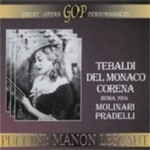This crude performance features two of the greatest singers of the 1950s at their most unimaginative. It could be argued that Mario del Monaco in particular was never a great thinker, but he’s particularly brassy here, singing at a consistent yell and coming across as irritated when he ought to be enamored: “Tra voi belle…”, his first aria, sounds like a threat. He’s relatively effective in the second-act outburst of passion, but his grief at Manon’s deportation in the third act, accompanied by maniacal sobbing, sounds like he’s laughing in some sort of demented way. As usual, his tone is thrilling and bronzed, but he paints no picture of the character and eventually we feel assaulted.
Tebaldi, in 1954, was still in control of all of her voice, and aside from a note or two at the top that can be called shrill, her singing is always lovely. Her “In quelle trine morbide” is melting in its dynamic shading, but it’s delivered meaninglessly. I’m not sure she had sung this role on stage at this point, but she obviously knows nothing about the character; we get neither the flirtatiousness nor the grief. Instead, all too often we get a certain hauteur that is absolutely inappropriate. But there are sheerly vocal moments, moments of soft, exquisite legato singing, that are head-spinningly beautiful–not enough to make the performance a success, though.
Mario Boriello is a self-involved but dry-voiced Lescaut and Fernando Corena, as Geronte, turns in the best performance in the opera–multi-faceted and not to be messed with. The rest of the cast is idiomatic, as is the conducting–nothing more. So unless you must have Tebaldi’s lovely moments, there’s no reason to own this. The sound is mediocre, with some distortion.
































